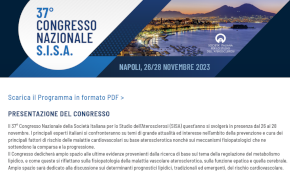 Rivista in lingua italiana
Rivista in lingua italiana
riservata ai Soci SISA
Ultimo numero:
Anno 14 • N.4/2023
Abstract
Lipid-Reduction Variability and Antidrug-Antibody Formation with Bococizumab
Ridker PM, Tardif JC, Amarenco P, Duggan W, Glynn RJ, Jukema JW, Kastelein JJ, Kim AM, Koenig W, Nissen S, Revkin J, Rose LM, Santos RD, Schwartz PF, Shear CL, Yunis C; SPIRE Investigators
N Engl J Med. [Epub ahead of print]
Background Bococizumab, a humanized monoclonal antibody targeting proprotein convertase subtilisin-kexin type 9 (PCSK9), reduces levels of low-density lipoprotein (LDL) cholesterol. However, the variability and durability of this effect are uncertain.
Methods We conducted six parallel, multinational lipid-lowering trials enrolling 4300 patients with hyperlipidemia who were randomly assigned to receive 150 mg of bococizumab or placebo subcutaneously every 2 weeks and who were followed for up to 12 months; 96% were receiving statin therapy at the time of enrollment. The patients were assessed for lipid changes over time, stratified according to the presence or absence of antidrug antibodies detected during the treatment period.
Results At 12 weeks, patients who received bococizumab had a reduction of 54.2% in the LDL cholesterol level from baseline, as compared with an increase of 1.0% among those who received placebo (absolute between-group difference, -55.2 percentage points). Significant between-group differences were also observed in total cholesterol, non-high-density lipoprotein cholesterol, apolipoprotein B, and lipoprotein(a) (P<0.001 for all comparisons). However, high-titer antidrug antibodies developed in a substantial proportion of the patients who received bococizumab, which markedly diminished the magnitude and durability of the reduction in LDL cholesterol levels. In addition, among patients with no antidrug antibodies, there was wide variability in the reduction in LDL cholesterol levels at both 12 weeks and 52 weeks. Major cardiovascular events occurred in 57 patients (2.5%) who received bococizumab and in 55 (2.7%) who received placebo (hazard ratio, 0.96; 95% confidence interval, 0.66 to 1.39; P=0.83). The most common adverse event among patients who received bococizumab was injection-site reaction (12.7 per 100 person-years).
Conclusions In six multinational trials evaluating bococizumab, antidrug antibodies developed in a large proportion of the patients and significantly attenuated the lowering of LDL cholesterol levels. Wide variation in the relative reduction in cholesterol levels was also observed among patients in whom antidrug antibodies did not develop
N Engl J Med. [Epub ahead of print]

Area Soci
Eventi



 SISA LIPID ACADEMY - Corso avanzato di lipidologia clinica
SISA LIPID ACADEMY - Corso avanzato di lipidologia clinicaModena, 22-23 Giugno 2023
[continua a leggere]Giornale Italiano Arteriosclerosi
HoFH today
 Rivista Italiana della
Rivista Italiana della
Ipercolesterolemia
Familiare Omozigote
Anno 5 • N.1/2023
Rivista NMCD
Diateca
[continua a leggere]
[continua a leggere]
Newsletter
il vostro indirizzo di posta elettronica
Progetto LIPIGEN

Nuovo sito dedicato al Progetto LIPIGEN
Progetto LIPIGEN - Vecchio portale
E' necessario essere loggati come utente
Lipigen per poter accedere alla pagina
PROject Statin Intolerance SISA
PROSISA – PROject Statin Intolerance SISA
E' necessario essere loggati come utente
PROSISA per poter accedere alla pagina
GILA - Lipoprotein Aferesi
Gruppo Interdisciplinare Lipoprotein Aferesi
(Accesso Gruppo GILA-Lipoprotein Aferesi)
E' necessario essere loggati come utente del Gruppo GILA per poter accedere
Gruppo Interdisciplinare Lipoprotein Aferesi
(Documentazione ad accesso libero)
Pagina informativa per medici e pazienti








